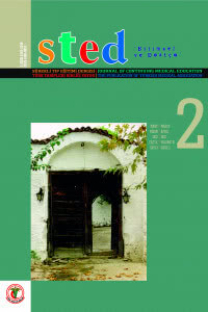COVID-19 Pandemisinde Gün Yüzüne Çıkan Bir Sorun: Regl Yoksulluğu ve Halk Sağlığı Hemşiresinin Sorumlulukları
A Problem Coming Forth in The Covid-19 Pandemic: Period Poverty and Responsibilities of the Public Health Nurse
___
- 1. Making the case for investing in menstrual health and hygiene. Population Services International, Global Menstual Collective. Accessed September 18, 2021, at https://menstrualhygieneday.org/ wp-content/uploads/2021/01/Making-the-Casefor- Investing-in-MHH-Report_Final.pdf
- 2. Hennegan J, Shannon AK, Rubli J, Schwab KJ, Melendez-Torres GJ. Women’s and girls’ experiences of menstruation in low- and middle-income countries: A systematic review and qualitative metasynthesis. PLoS Med 2019;16(5):e1002803.
- 3. Rossouw L, Ross H. Understanding period poverty: socio-economic inequalities in menstrual hygiene management in eight low-and middle-income countries. Int. J. Environ. Res 2021;18(5):2571.
- 4. Guidance on Menstrual Health and Hygiene. United Nations International Children’s Emergency Fund (UNICEF). Accessed September 18, 2021, at https://www.unicef.org/media/91341/ file/UNICEF-Guidance-menstrual-healthhygiene- 2019.pdf
- 5. Habtegiorgis Y, Sisay T, Kloos H, Malede A, Yalew M, Arefaynie M, et al. Menstrual hygiene practices among high school girls in urban areas in Northeastern Ethiopia: A neglected issue in water, sanitation, and hygiene research. PloS one. 2021;16(6):e0248825.
- 6. Garg SG, Alvi R, Gupta S, Ahmad A. Exploring college student’s menstruation-related difficulties during early COVID-19 lockdown period in North India. J Public Health Prim Care 2020;1(1):22.
- 7. DeMaria AL, Delay C, Sundstrom B, Wakefield AL, Naoum Z, Ramos-Ortiz J, et al. “My mama told me it would happen”: menarche and menstruation experiences across generations. Women Health 2020;60(1):87-98.
- 8. Mohammed S, Larsen-Reindorf RE. Menstrual knowledge, sociocultural restrictions, and barriers to menstrual hygiene management in Ghana: Evidence from a multi-method survey among adolescent schoolgirls and schoolboys. Plos one. 2020;15(10):e0241106.
- 9. Rheinländer T, Gyapong M, Akpakli DE, Konradsen F. Secrets, shame and discipline: School girls’ experiences of sanitation and menstrual hygiene management in a peri-urban community in Ghana. Health Care Women Int 2019;40(1):13- 32.
- 10. Kuhlmann AS, Bergquist EP, Danjoint D, Wall LL. Unmet menstrual hygiene needs among low-income women. Obstet Gynecol 2019;133(2):238-44.
- 11. Cardoso LF, Scolese AM, Hamidaddin A, Gupta J. Period poverty and mental health implications among college-aged women in the United States. BMC Women’s Health. 2021;21(1):14.
- 12. Achuthan K, Muthupalani S, Kolil VK, Bist A, Sreesuthan K, Sreedevi A. A novel banana fiber pad for menstrual hygiene in India: a feasibility and acceptability study. BMC Women’s Health. 2021;21(1):1-14.
- 13. Sustainable Development Goals: 2030. United Nations Development Programme. Accessed September 18, 2021, at https://www. undp.org/sustainable-development-goals
- 14. Singh B, Zhang J, Segars J. Period poverty and the menstrual product tax in the United States [29F]. Obstet Gynecol 2020;135:68S.
- 15. Crawford BJ, Waldman E. Period Poverty in a Pandemic: Harnessing Law to Achieve Menstrual Equity, 98 Washington University Law Review 1569 (2021), Accessed September 18, 2021, at https://ssrn.com/abstract=3692802SSRN
- 16. Birleşmiş Milletler İnsan Hakları Komisyonu. Report of the Special Rapporteur on the human right to safe drinking water and sanitation, Catarina de Albuquerque. Twenty-seventh session. 2014:1-28.
- 17. Crichton J, Okal J, Kabiru CW, Zulu EM. Emotional and psychosocial aspects of menstrual poverty in resource-poor settings: a qualitative study of the experiences of adolescent girls in an informal settlement in Nairobi. Health Care Women Int. 2013;34(10):891-916.
- 18. Withanarachchie V. Period poverty in New Zealand: the failed recognition of menstrual products as basic health necessities: ResearchSpace at Auckland; 2020.
- 19. Wootton SA. Menstrual poverty and discourses of menstruation in New Zealand school girls’ narratives:” It’s just not a subject that comes up in talking”: a thesis presented in partial fulfilment of the requirements for the degree of Master of Science in Health Psychology at Massey University, Manawatū, New Zealand: Massey University; 2018.
- 20. Plan International UK, Tingle C. Break the Barriers: Girls’ experiences of menstruation in the UK: 2018.
- 21. Guyatt T. UNESCO: Millions of girls are out of school-but data show that gender alone is not the main culprit. Accessed September, 18, 2021, at http://uis.unesco.org/en/blog/millions-girls-areout- school-data-show-gender-alone-not-mainculprit
- 22. Rodriguez L. Global Citizen: The Tampon Tax: Everything You Need to Know 2021 Accessed September, 18, 2021, at https://www. globalcitizen.org/en/content/tampon-taxexplained- definition-facts-statistics/
- 23. T.C. Resmi Gazete. Mal ve Hizmetlere Uygulanacak Katma Değer Vergisi Oranlarının Tespitine İlişkin Kararda Değişiklik Yapılmasına Dair Karar (Karar Sayısı: 5359). Accessed April, 15, 2022, at https://www.resmigazete.gov. tr/29.03.2022
- 24. UNICEF. Periods in the pandemic: 9 things we need to know Accessed September, 18, 2021, at https://www.unicef.org/coronavirus/covid-19- periods-in-pandemic-9-things-to-know
- 25. Bawa M, Seshu U, Rai Gupta A, Sindhu M, Arora M, Dabriwal S. COVID-19 Induced menstrual hygiene management adversities and impact assessment of project Baala’s intervention in response to these adversities in peri-urban fringes of Delhi. SSRN 2020:3733664.
- 26. Li A. How China’s coronavirus health care workers exposed the taboo on menstruation. South China Morning Post 2020.
- 27. Zipp S, Mørk Røstvik C, Purcell C. Ending period poverty: Scotland’s plan for free menstrual products shatters taboos and leads a global movement. The Conversation 2018.
- 28. Konuşmamız Gerek Derneği. Accessed Septembe 18, 2021, at https://konusmamizgerek.org/
- 29. Cohen BE, McKay M. The role of public health agencies in addressing child and family poverty: Public health nurses’ perspectives. Open Nurs 2010;4:60.
- 30. Welch D, Kneipp S. Low-income housing policy and socioeconomic inequalities in women’s health: the importance of nursing inquiry and intervention. Policy Polit Nurs Pract 2005;6(4):335-42.
- ISSN: 1300-0853
- Yayın Aralığı: 6
- Başlangıç: 1992
- Yayıncı: -
Nomofobi ve COVID-19 Pandemisi
İzzet FİDANCI, Hilal AKSOY, Duygu AYHAN BAŞER
Üniversite Öğrencilerinin Jinekolojik Kanser Farkındalıkları ve İlişkili Faktörler
COVID-19 Pandemi sürecinde Tüberküloz Tanısı Alan Hastaların Deneyimleri: Nitel Araştırma
Fatma Özlem ÖZTÜRK, Derya ÖZTOMURCUK, Nazan TURAN, Muhammet Ali ORUÇ
Halil SALKAYA, Raziye DUT, Zuhal Aydan SAĞLAM, Serdar CÖMERT
Hülya ÇAŞKURLU, Özlem ŞEN AYDIN, Pınar ERGEN
Okul Çocuğunda El Hijyeni Değerlendirme Soru Formunun Türkçe Geçerlik ve Güvenirliği
Yaşlı Bireylerin Günlük Yaşam Aktiviteleri ile Düşme Riski Arasındaki İlişkinin İncelenmesi
Canan BOZKURT, Berna CAFER KARALAR, Serap HOŞAF, Ayfer KARADAKOVAN
Ebru SÖNMEZ SARI, Handan TERZİ
Üniversite Hastanesine Başvuran Hastalarda Akılcı İlaç Kullanımı ve Etkileyen Faktörler
Ailesinde Meme Kanseri Öyküsü Olan Kadınlarda Meme Kanseri Tarama Davranışları
